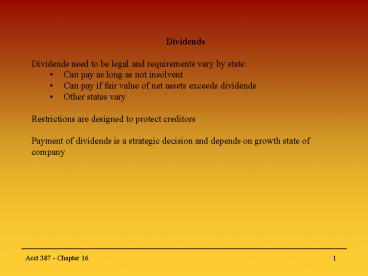Dividends PowerPoint PPT Presentation
Title: Dividends
1
- Dividends
- Dividends need to be legal and requirements vary
by state - Can pay as long as not insolvent
- Can pay if fair value of net assets exceeds
dividends - Other states vary
- Restrictions are designed to protect creditors
- Payment of dividends is a strategic decision and
depends on growth state of company
2
- Types of dividends
- Cash
- Property
- Scrip
- Liquidating
- Stock
- Important dates
- Declaration date
- Record date
- Ex-dividend date
- Payment date
3
Cash dividends become a liability when
declared Property dividends require that the
property be revalued to fair value and gain/loss
recognized before distribution Scrip dividends
are when the corporation distributes an IOU
instead of cash. Liquidating dividends represent
a return of capital instead of retained earnings
and should be charged to paid in capital
4
Stock Splits Stock dividends are a pro rata
distribution of shares to owners which change no
ones ownership share. Small stock dividend
(less than 20-25) are accounted for at market
Large stock dividends are accounted for at
par. Actual impact of a stock dividend is to
reduce retained earnings and future cash dividend
potential.
5
Stock Splits Stock splits are used to reduce the
share price in the market to keep a stock in the
trading range. Simply reduce the par value and
increase the shares outstanding. No formal
journal entry is needed. Unlike a stock
dividend, retained earnings is not
affected. Like a stock dividend, total
stockholders equity is not affected.
6
Preferred Dividends Preferred dividends can be
cumulative or noncumlative participating or
nonparticipating
7
Appropriations of Retained Earnings If
management wants to send a message that certain
parts of retained earnings are legally or
strategically not available for dividends,
retained earnings may be appropriated. This is
done with a simple journal entry which is
reversed when the appropriation is no longer
needed. The same thing can be accomplished, many
believe with less confusion, through a note
disclosure.
8
Ratios Return on equity Net income preferred
div Avg Common SE Payout ratio Common
cash dividend Net income preferred
dividend Price Earnings Ratio Market
price per share EPS
PowerShow.com is a leading presentation sharing website. It has millions of presentations already uploaded and available with 1,000s more being uploaded by its users every day. Whatever your area of interest, here you’ll be able to find and view presentations you’ll love and possibly download. And, best of all, it is completely free and easy to use.
You might even have a presentation you’d like to share with others. If so, just upload it to PowerShow.com. We’ll convert it to an HTML5 slideshow that includes all the media types you’ve already added: audio, video, music, pictures, animations and transition effects. Then you can share it with your target audience as well as PowerShow.com’s millions of monthly visitors. And, again, it’s all free.
About the Developers
PowerShow.com is brought to you by CrystalGraphics, the award-winning developer and market-leading publisher of rich-media enhancement products for presentations. Our product offerings include millions of PowerPoint templates, diagrams, animated 3D characters and more.

